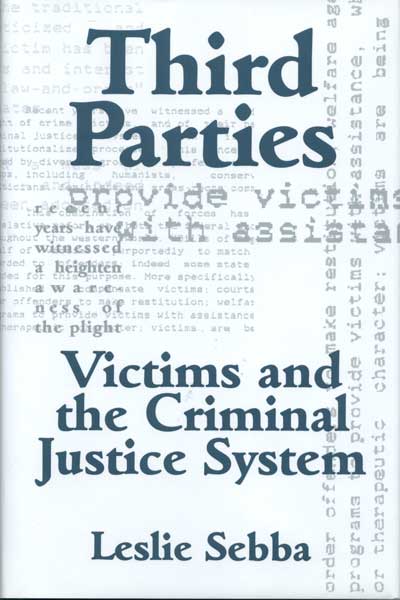Third PartiesVictims and the Criminal Justice SystemLeslie Sebba |
 1996 446 pp. 6x9  $39.95 paper 978-0-8142-0668-3 Add paper to shopping cart $52.95 cloth 978-0-8142-0664-5 Add cloth to shopping cart Shopping Cart Instructions Review/Change Shopping Cart & Check-out | |||
|
|
“Sebba is well suited to the encyclopedic nature of the objectives of Third Parties. With expertise in both criminology and law, he is able to speak in an informed way about research on attitudes and behavior as well as the substance and process of legal systems. As one of the founding editors of a journal on victimology and as the author of considerable research in that field, he is well suited to the challenge in the aforementioned synthesis and integration. Moreover, Sebba brings a decided and important comparative cast to the analysis as he is well versed in several legal traditions and draws informative comparisons from one country to another.” —The Law and Politics Book Review Recent years have seen a heightened awareness of the plight of victims of crime and of their neglect by the traditional criminal justice system with its bureaucratic and institutional processes. This concern for the victim has been shared by diverse groups, including humanists, conservative “law and order” politicians, feminists, and grassroots community advocates. This combination of forces has stimulated a mass of legislative reform at both the federal and state levels. Many jurisdictions have adopted a “Bill of Rights” for the victim; public funds have been established to compensate victims; courts have been enjoined to order offenders to make restitution; welfare agencies have developed programs to provide victims with assistance; and courts are inviting victims to testify at the sentencing hearings of their offenders. These reforms and proposals have been accompanied by a growing body of literature that discusses the needs of victims and analyzes the merits and drawbacks of particular reforms, some of which have been evaluated empirically. What has been lacking until now is an integrated overview that looks at their philosophical underpinnings and considers how these different and sometimes conflicting proposals are conceptually related to one another and to other prevailing criminal justice doctrines and ideologies. Leslie Sebba fills this gap in Third Parties. Sebba first establishes a set of criteria by which to evaluate proposals and reforms by identifying the parameters of an optimal criminal justice system. From this perspective, he then discusses individual victim-related reforms such as restitution and “”desert sentencing, involvement of the victim in the criminal procedure, state compensation for victim, informal modes of dispute resolution, victim assistance, and victims’ bills of rights. What emerges most clearly from Sebba’s timely and encyclopedic work is the need to re-think many of the issues involved. The first book-length study of its kind, this volume is recommended reading for policy makers in the field of victim reform and is essential for scholars and students in victimology, victims and the criminal justice system, the sociology of law, criminal justice policy, and law and social policy. Leslie Sebba is professor of criminology on the faculty of law at the Hebrew University of Jerusalem. He is the coauthor of Rehabilitation as Punishment: The Treatment of Drug-Addict Offenders and Punishment under the “Service Work” Law: An Evaluation and the co-editor of Criminology in Perspective: Essays in Honor of Israel Drapkin. He is one of the founding editors of The International Review of Victimology. | |||

